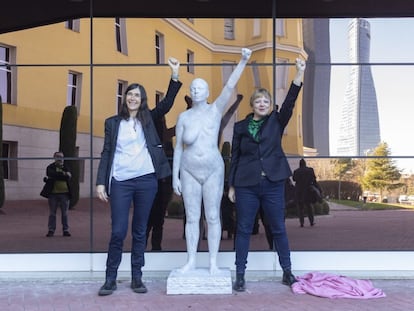The weight of words: Not all cancer is ‘cancer’
The term emphasizes invasion and destruction, but metaphors can be harmful for the disease’s patients: they condition, blame and hide the real problems

If you visit the Spanish National Cancer Research Center, you will be received by a sculpture by the artist Marina Vargas. Sculpted in Carrara marble, the figure is a life-size representation of the artist. Marina Vargas shows off her mastectomy and raises a triumphant fist. Marina triumphs over the fear of her cancer diagnosis.
Marina has spoken to me often of Anne Boyer’s book The Undying, winner of the Pulitzer Prize for Nonfiction in 2020. Boyer recalls her experience with her own breast cancer, aggressive chemotherapy, her tiredness, her fears. Inevitably, Boyer invokes Susan Sontag, specifically her planned essay about the causes of death in women, which the philosopher hoped to write about cases like Virginia Woolf and other famous women.
Sontag herself suffered from breast cancer and was cured, but decades later another cancer ended her life. She did have time to publish, in 1978, what may be the best philosophical text on cancer: Illness and Metaphor.
“My point is that illness is not a metaphor, and that the most truthful way of regarding illness — and the healthiest way of being ill — is one most purified of, most resistant to, metaphoric thinking,” she writes. Metaphors are the result of “stereotypes,” of lack of knowledge and the lack of scientific understanding of the disease’s origin and cure.
Metaphors are harmful for cancer patients — they condition, blame and hide the real problems. They use a language of war: cancer is the enemy, the murderer; its patients are victims, but also guilty. Cancer is defeated with a struggle, a crusade, bombing with chemotherapy. As in war, aggressive solutions and collateral damage are expected. With the 1971 National Cancer Act, President Richard Nixon famously declared the “war on cancer.”
Cancer invades, colonizes, grows and destroys. It is a voracious predator, like Saturn eating his children. The term emphasizes deregulation, the anomalous, the incoherent: cancer of society, cancer of the economy…
These unhelpful metaphors have as an antidote, says Sontag, research and progress in knowledge about what cancer is. Sontag pointed out that there exists not just one type of cancer, but hundreds. Today we can say that cancer encompasses thousands of diseases, as many as there are cancer patients. Maybe the word “cancer” shouldn’t be used for all these diseases?
Research has managed to strip many types of cancer of their lethal power. The term cancer, in more and more cases, is no longer synonymous with death, or even with serious illness. “Not everything we call cancer should be called cancer,” oncologists Laura Esserman and Scott Eggener recently wrote in The New York Times. “Despite amazing advances in our understanding of the disease, we have neglected to update how we define what has been called the emperor of all maladies. Some cancers have extraordinarily low risks of altering the quality or length of life but get lumped in with those that do.” The World Health Organization describes cancer as “a group of diseases that can originate in almost any organ or tissue in the body when abnormal cells grow uncontrollably, exceed their normal limits and invade adjacent parts of the body and/or spread to other organs.” The term is attributed to Hippocrates, which implies that its meaning has had more than 2,500 years to evolve and, above all, to accumulate power.
But now, thanks to research, many people who receive a diagnosis of cancer will hardly see the length and quality of their life altered, either because they will be treated promptly and effectively or because we know, due to the characteristics of that particular tumor, that the prognosis is good.
That is the way to deactivate the threat of the word “cancer”: move increasingly towards much more personalized and precise diagnoses and treatments and away from fear. Let’s not use metaphors in cancer. Let’s look at it head-on, with research and science.
Sign up for our weekly newsletter to get more English-language news coverage from EL PAÍS USA Edition
Tu suscripción se está usando en otro dispositivo
¿Quieres añadir otro usuario a tu suscripción?
Si continúas leyendo en este dispositivo, no se podrá leer en el otro.
FlechaTu suscripción se está usando en otro dispositivo y solo puedes acceder a EL PAÍS desde un dispositivo a la vez.
Si quieres compartir tu cuenta, cambia tu suscripción a la modalidad Premium, así podrás añadir otro usuario. Cada uno accederá con su propia cuenta de email, lo que os permitirá personalizar vuestra experiencia en EL PAÍS.
¿Tienes una suscripción de empresa? Accede aquí para contratar más cuentas.
En el caso de no saber quién está usando tu cuenta, te recomendamos cambiar tu contraseña aquí.
Si decides continuar compartiendo tu cuenta, este mensaje se mostrará en tu dispositivo y en el de la otra persona que está usando tu cuenta de forma indefinida, afectando a tu experiencia de lectura. Puedes consultar aquí los términos y condiciones de la suscripción digital.









































